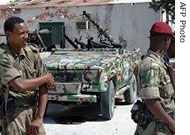VOA标准英语10月-Unified Ethiopian Opposition Seeks Troop Withdraw(在线收听)
 |
| Ethiopian soldiers in Mogadishu (file photo) |
Virtually all of Ethiopia's opposition parties have opposed military involvement in neighboring Somalia since troops were sent to dislodge Islamic militants controlling Mogadishu and surrounding territory in late 2006.
But last week, the lone holdout among the opposition groups, the Ethiopian Democratic Party sent a letter to Prime Minister Meles Zenawi saying the sacrifice of lives and scarce financial resources had become unbearable.
Party President Lidetu Ayalew says after nearly two years of propping up Somalia's weak transitional government, it is time for Ethiopian troops to go home and demand international organizations such as the United Nations and the African Union take responsibility.
"We are sacrificing a lot. It takes our expenses, we are losing many soldiers there, when you see the international media, our image is in danger ... There must be one point to end our presence in Somalia. We believe the AU and U.N. should play their role, but now it is Ethiopia that is holding the whole burden," he said.
Another opposition leader, Beyene Petros of the United Ethiopian Democratic Front says his party wants the government to reveal the cost of the 21-month Somalia campaign, both in terms of lives lost and money spent.
"The government has irresponsibly refused to account on these two pertinent issues relating to the Ethiopian army's deployment to Somalia," he said. "Every country's parliament, even the public at large, has a right to know what its involvement is costing in terms of life and resources. We have been kept in the dark."
Ethiopia Foreign Minister Seyoum Mesfin this week signaled his country's frustration at being left virtually alone to battle Somalia's raging insurgency. In a speech to the U.N. General Assembly in New York, Seyoum demanded the world body dispatch a peacekeeping force, and that the undermanned African Union force in Somalia known as AMISOM be significantly strengthened.
Foreign Ministry spokesman Wahide Belay says Ethiopian troops were dispatched in the belief they would only be a vanguard, and would quickly return home after achieving their objective of driving the Islamists out of Mogadishu.
"We were promised U.N. forces and AMISOM forces would replace us after we achieve the main objective. That did not happen, except a few forces. Ethiopia is still waiting for the U.N. to send peacekeeping troops to Somalia or help AMISOM to achieve objectives," he said.
In the nearly two years they have been in Somalia, Ethiopian forces have increasingly become part of the problem rather than the solution, allowing Jihadist forces known as the Shabaab to gain support by capitalizing on anti-Ethiopian sentiment.
Prominent Ethiopian opposition lawmaker Bulcha Demeksa says longstanding ethnic, religious and political animosities make it impossible to persuade Somalia's people that Ethiopia wants to help them.
"No Somali would consider Ethiopia as a savior. They all thought, all of them thought Ethiopia was invading Somalia and they would fight Ethiopia as long as they could," Demeksa said. "They resolved to fight against us, and they are fighting, and in my opinion they are winning."
Opposition leaders are planning to demand a full debate on Somalia when parliament convenes next week. But many in the international community are cautioning Ethiopia not to make any moves that might undermine delicate diplomatic efforts to mediate a ceasefire agreement between the transitional government it supports and an Islamist-led opposition faction.
There has been a notable calm in Mogadishu in recent days, after what had been a particularly nasty surge of violence, giving hope that there might finally be peace for a blue-helmeted U.N. force to keep.
But Ethiopian opposition figures like Temesgen Zewde, a leader of the newly-formed Unity, Democracy and Justice Party say the temporary peace is an illusion.
Temesgen argues that Ethiopia should get out immediately, because the United Nations has no intention of entering what experts perceive as a no-win situation in Somalia.
"I am saying cut your losses and get out. The international community is not going to rescue the Somali people, they have had three years to do so, everybody has stood on sideline and watched the people and defense forces suffering, and we think it is never too late, and the PM [prime minister] is looking for ways to withdraw forces, and my advice is to do it as quickly as possible, and not wait for the international community to react," said Temesgen.
Foreign Ministry spokesman Wahide Belay says Ethiopian troops are doing well and will stay until replacement forces arrive.
"I do not believe we are mired in Somalia. We can get out any time. We will not. This is what the prime minister said. We are not in a quagmire, can get out anytime," he said. "But we cannot abandon the TFG [Transitional Federal Government] and Somali people, have to see progress in reconciliation so we do not want to abandon them in middle of crisis in Somalia."
Opposition lawmakers will be listening carefully Monday to see whether Ethiopian President Girma Woldegiorgis mentions the subject of troops in Somalia in his opening address to parliament, as Foreign Minister Seyoum prominently did at the United Nations this week. That could be the signal they are waiting for that the government is prepared to rethink its much-criticized Somalia strategy.